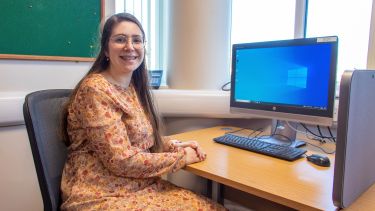The university is welcoming, with a rich cultural scene

What made you decide to study at the University of Sheffield?
“I trained in Turkey as a preschool teacher and guidance counsellor, supporting children who might need extra provision or referrals for specialist assessments. I was interested in doing a masters, not just to pursue a career in higher education but to get a better understanding of how to serve the needs of the children in my care. Growing up as a bilingual child I was also fascinated by language and its development.
“A scholarship became available from the Turkish government that specifically wanted people to study areas within speech and language therapy, as it is a newly developing domain in Turkey. They were introducing the subject at an undergraduate level in a number of universities and they needed people to go and study and come back as lecturers. I thought ‘why not go and study?’
“The scholarship was for one year, and out of the courses available Speech Difficulties at the University of Sheffield ticked all the boxes. It was a good university, and I liked that it was tailored specifically to children as that was something I’d had experience with.”
What did you enjoy most about the course?
A lot of my cohort were Speech and Language Therapists so I was afraid that the course would require a lot of extensive background knowledge. However, the course was designed with extensive reading lists that you can read based on your interests and needs, and the tutors didn’t assume everyone knew all the concepts. I really liked this as it helped people coming from different backgrounds and experiences.
Meryem Sumeyye Ustun
“I was part of a small cohort of full time students so our lectures were really tailored - it was much easier to ask questions and get to know our lecturers. We made a nice group - we socialised and studied together, and it was nice to hear from other students who were trained as SLTs who could give examples from their own work.
“I also quite enjoyed my masters research project and even managed to publish it. I worked with university students and measured their attitudes towards stuttering, focusing on three different cultural backgrounds. I found that a student’s home culture made more of an impact on how they perceive stuttering than where they currently live. I felt quite supported during the research project - since this was the first research project I conducted I was a little worried. After putting forward our initial ideas we were matched with a suitable tutor. My tutor helped me brainstorm ideas and come up with an interesting project which would be realistic in the time I had.”
How did the course influence the next steps in your career?
“My scholarship was a package deal - I was funded to do a masters followed by a PhD, both in areas related to speech and language, so I knew I’d follow the course with further study. Once I finish my PhD, I will return to Turkey as a lecturer.
“Turkey’s speech and language programmes are quite medically focused, and I was worried about having to do something similar without necessarily having the knowledge or skill base. Doing this masters showed me I didn’t need to do that. It highlighted the link between literacy and speech and language, which is what I’m now focusing on for my PhD. I’m currently looking into how we support older children who have reading difficulties.
“Initially there was this small part of me that contemplated moving to Manchester for my PhD. This was mostly because I wanted to live in a bigger city as I come from a very big city back home and Sheffield felt quite small. However by the end of the course there was no question mark in my mind - I wanted to stay at Sheffield and I didn’t even apply anywhere else! I’m now in my third year of my PhD with a year left to go.”
What would you say to a student thinking about studying this course?
“While I do think that Sheffield is a small city, for students it’s still beneficial as it’s not very expensive. There’s quite a lot of amenities and student life is quite vibrant. The university is also welcoming, with a rich cultural scene and strong sense of community. There are a lot of societies and clubs you can get involved in which is really good for meeting people with similar interests if you are new to Sheffield or the UK.
“I’d suggest thinking first about what your expectations are for your course, and then look at the city. Do your own research and attend open days or speak to past students. That’s often the best way to see how happy current students are and what the culture is like. I feel like our department is very open and the teaching staff are approachable and responsive.”

Masters study discovery afternoon
See where a Sheffield masters could take you with our on-campus event. Get expert advice, take a campus tour and chat to current students.

